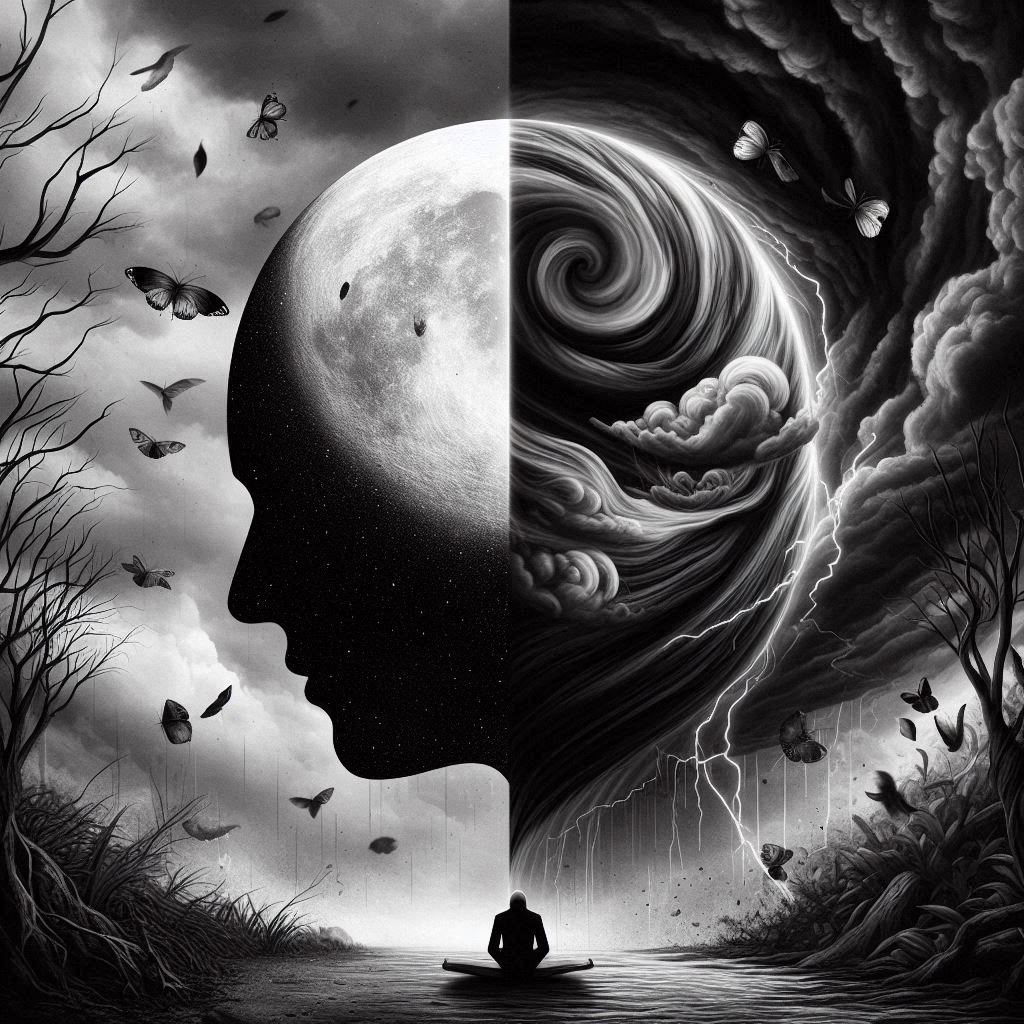Is depression caused by a chemical imbalance? This age-old question has sparked debates within the medical and scientific communities for decades. Understanding the intricate relationship between mental health and brain chemistry is crucial in shedding light on the complexities of depression. By exploring the nuances of this topic, we can deepen our comprehension of the factors that contribute to this debilitating condition.
Understanding Depression
Depression is a mental health disorder that affects millions of individuals worldwide. It is characterized by persistent feelings of sadness, loss of interest in activities, fatigue, and changes in appetite and sleep patterns. These symptoms can significantly impact an individual’s daily life, making it challenging to carry out routine tasks and maintain social relationships.
Symptoms of Depression
Depression can manifest in numerous ways, and recognizing the signs is a crucial step toward seeking help. Here are some of the most common symptoms:
- Persistent sadness: Feelings of deep and prolonged sorrow that do not seem to lift.
- Loss of interest: Lack of enthusiasm or pleasure in activities that were once enjoyable.
- Fatigue: Constant tiredness or lack of energy, even after resting.
- Changes in appetite: Significant weight loss or gain due to altered eating habits.
- Sleep disturbances: Insomnia or oversleeping, leading to disruptions in the sleep-wake cycle.
These symptoms may vary in intensity, but they all contribute to making everyday tasks feel overwhelming. Understanding these signs is key to recognizing that someone might need help.
Prevalence of Depression
Depression is a prevalent mental health condition globally, with an increasing incidence over recent years. According to the World Health Organization, more than 264 million people of all ages suffer from depression. This makes depression a leading cause of disability worldwide, emphasizing the urgent need for awareness, understanding, and effective treatment options.
For more information on global mental health statistics and resources, you can visit the World Health Organization’s Depression factsheet to gain further insight into the impact of depression on individuals and societies.
The Chemical Imbalance Theory
The concept of a chemical imbalance as a potential cause of depression has been a focal point in the field of psychiatry. The theory suggests that disruptions in the brain’s neurotransmitters, particularly serotonin, dopamine, and norepinephrine, play a significant role in the onset and persistence of depressive symptoms.
Origin of the Theory
The chemical imbalance theory emerged in the mid-20th century as researchers sought to unravel the underlying mechanisms of mental illnesses. Initially, it was met with enthusiasm as it provided a seemingly tangible explanation for complex mood disorders like depression. The idea that imbalances in neurotransmitters could lead to emotional disturbances resonated with both the scientific community and the public, offering a straightforward narrative for a multifaceted condition.
This theory gained momentum when scientists discovered the effects of certain drugs on mood. For example, medications like monoamine oxidase inhibitors (MAOIs) and selective serotonin reuptake inhibitors (SSRIs) provided support by showing that adjusting brain chemistry could alleviate depressive symptoms. As these drugs gained popularity, so did the chemical imbalance theory, becoming ingrained in both medical practice and public consciousness.
Supporting Research
Numerous studies have attempted to validate the chemical imbalance theory by investigating the levels of neurotransmitters in individuals with depression compared to those without. Research has shown that certain antidepressant medications, such as SSRIs, can effectively alleviate depressive symptoms by altering neurotransmitter levels in the brain.
Here are a few key studies that support the chemical imbalance theory:
- Early Pharmacological Research: Studies in the 1950s and 60s discovered that drugs like MAOIs and tricyclic antidepressants had mood-improving effects by increasing neurotransmitter levels. These findings bolstered the hypothesis that depression could be linked to chemical imbalances.
- Prozac and SSRIs: The introduction of Prozac in the 1980s marked a significant advancement. Studies showed that SSRIs, which increase serotonin levels in the brain, were effective in treating depression. This reinforced the chemical imbalance theory significantly.
- Neuroimaging Studies: Advances in brain imaging technologies have also supported this idea. MRI and PET scans have revealed differences in brain activity and chemistry between depressed individuals and healthy controls.
Despite the evidence, it’s important to recognize that the chemical imbalance theory has its critics, and the field of psychiatry continues to explore and refine our understanding of depression. For further exploration of the historical context and scientific advancements related to the chemical imbalance theory, you can refer to Psychiatry.org for a comprehensive overview of the evolution of theories surrounding depression and its neurobiological underpinnings.
Debunking the Myth of Chemical Imbalance
The widespread belief that depression is solely caused by a chemical imbalance in the brain oversimplifies the complexities of this mental health condition. While neurotransmitters like serotonin, dopamine, and norepinephrine play a role in regulating emotions, the reality is far more intricate.
Complexity of Depression
Depression is a multifaceted disorder influenced by a myriad of factors, including genetic predispositions, environmental stressors, and psychological makeup.
- Genetic Factors: Genetic studies have demonstrated that heredity plays a significant role in depression. Certain gene variations may increase an individual’s susceptibility to depressive episodes. This doesn’t mean that someone will definitely develop depression if they have a family history, but the risk is higher.
- Environmental Triggers: Traumatic life events, such as the loss of a loved one or chronic stress from ongoing situations like financial problems or relationship issues, can contribute significantly to the onset of depression. These stressors can alter brain function and trigger depressive symptoms.
- Psychological Influences: Psychological factors, such as negative thought patterns, low self-esteem, and poor coping mechanisms, play a crucial role. These can be influenced by early childhood experiences and ongoing life challenges. It’s a bit like a snowball effect – negative experiences and thoughts can accumulate, leading to more profound feelings of sadness and hopelessness over time.
Alternative Explanations
Several theories challenge the idea that depression is merely a result of chemical imbalances:
- Psychosocial Model: This model emphasizes the impact of social relationships, life events, and behaviors on mental health. For instance, someone raised in a supportive, healthy environment may be more resilient to stress and less likely to experience depression than someone who grew up in a challenging or abusive setting. This model also considers the role of ongoing societal pressures and life transitions.
- Cognitive Theories: These theories focus on how negative thinking patterns can perpetuate depression. Cognitive Behavioral Therapy (CBT) is a popular treatment that targets these maladaptive thoughts. It aims to help individuals reframe their thinking, much like reprogramming a computer, to improve their mood and behavior.
In essence, depression is not a straightforward issue of chemical imbalances alone. Addressing it requires a holistic approach that considers genetic, environmental, and psychological factors. Understanding the complex nature of depression helps to develop better, more comprehensive treatment strategies that cater to the diverse needs of individuals.
For further exploration of diverse perspectives on depression and its treatment modalities, you can refer to Psychology Today’s article on Alternative Explanations for Depression to delve deeper into the nuanced landscape of theories surrounding depression causation.
The Role of Neurotransmitters in Depression
Neurotransmitters are chemical messengers in the brain that significantly influence mood, emotions, and overall mental health. Understanding how these chemicals interact can help us grasp the complexity of depression and why it’s not merely about a single “chemical imbalance.”
Serotonin and Depression
Serotonin is often called the “feel-good” neurotransmitter because it helps regulate mood, sleep, and appetite. The popular theory suggests that low levels of serotonin are a primary cause of depression. This idea is supported by the way selective serotonin reuptake inhibitors (SSRIs), like Prozac, increase serotonin levels and help alleviate depressive symptoms.
However, the story is not that simple. Research shows that:
- Receptor Sensitivity: Some people with depression might have receptors that are less sensitive to serotonin, rather than having low serotonin levels themselves.
- Genetic Factors: Genetic differences can affect how serotonin is used by the brain, influencing susceptibility to depression.
- Environmental Stressors: Stressful life events can disrupt the serotonin system, contributing to depressive symptoms.
This means that while serotonin plays a role in depression, it’s not the whole picture. The brain’s handling of serotonin is just one piece of a much larger puzzle.
Dopamine and Other Neurotransmitters
Dopamine is another key player in the brain’s chemistry, often linked to pleasure and motivation. When dopamine levels are off, it can lead to feelings of lethargy and anhedonia, where you lose interest in activities you once enjoyed. Some important points to consider are:
- Mood and Reward: Dopamine helps regulate the brain’s reward system. An imbalance can make it hard to feel pleasure, a common symptom of depression.
- Motivation and Energy: Low dopamine levels can result in decreased motivation and energy, making daily tasks feel like a chore.
Norepinephrine, another neurotransmitter, is involved in the body’s response to stress and arousal levels. Disruptions in norepinephrine can cause anxiety and mood swings.
Besides serotonin, dopamine, and norepinephrine, other neurotransmitters such as GABA and glutamate also play a role in mood regulation:
- GABA: This neurotransmitter has an inhibitory effect and helps calm the brain. Low GABA levels are associated with anxiety and mood disorders.
- Glutamate: An excitatory neurotransmitter that is vital for brain function. Imbalances in glutamate can lead to various psychiatric conditions, including depression.
Understanding the complex interplay between these neurotransmitters highlights that depression is not caused by a single chemical imbalance. It’s a condition influenced by a network of interactions, involving multiple neurotransmitters and receptors.
For more in-depth information, you can read about neurotransmitter systems and their role in depression from Psychiatric Times.
Holistic Approaches to Treating Depression
People often seek comprehensive methods to address depression that go beyond focusing solely on chemical imbalances in the brain. Holistic treatment strategies consider various aspects of an individual’s well-being to create a more nuanced and personalized approach to managing depressive symptoms.
Therapy and Lifestyle Interventions
Therapy, exercise, nutrition, and mindfulness practices are integral components of holistic approaches to treating depression. These interventions offer a holistic perspective that recognizes the interconnectedness of physical, emotional, and mental well-being.
Therapy: Psychological therapies like Cognitive Behavioral Therapy (CBT) and Interpersonal Therapy (IPT) are highly effective in helping individuals understand and change negative thought patterns, develop coping strategies, and improve interpersonal relationships. Therapy provides a safe space for exploring emotions and working through challenges that contribute to depression.
Exercise: Physical activity has been shown to have a profound impact on mental health. Regular exercise releases endorphins, the body’s natural mood elevators, and reduces symptoms of depression. Whether it’s a brisk walk, yoga practice, or strength training, incorporating exercise into daily routines can boost mood and overall well-being.
Nutrition: A balanced diet rich in essential nutrients is crucial for supporting brain function and emotional stability. Foods high in omega-3 fatty acids, vitamins, and minerals can positively influence mood and energy levels. Making dietary changes and incorporating whole, nutrient-dense foods can have a significant impact on mental health.
Mindfulness: Practices like mindfulness meditation and yoga promote present-moment awareness and relaxation. These techniques help individuals cultivate a sense of calm, reduce stress levels, and enhance self-awareness. Mindfulness practices can be powerful tools in managing depressive symptoms and improving overall emotional resilience.
Combining Therapy with Medication
While therapy plays a vital role in treating depression, combining it with medication when necessary can provide comprehensive care for individuals struggling with severe symptoms. The synergy between therapy and medication can address both the psychological and physiological aspects of depression, leading to better outcomes and enhanced symptom management.
Benefits of Combination Therapy: Combining therapy with medication allows for a holistic treatment approach that targets both the root causes of depression and its symptoms. Medication can help regulate neurotransmitter levels in the brain, providing relief from severe mood disturbances, while therapy addresses underlying issues and provides coping strategies.
Personalized Treatment Plans: It’s essential for healthcare providers to create individualized treatment plans that consider each person’s unique needs and preferences. By tailoring interventions to specific circumstances, professionals can optimize the effectiveness of therapy and medication, ensuring a more holistic and personalized approach to managing depression.
By integrating therapy, lifestyle interventions, and medication when necessary, holistic treatment strategies offer a comprehensive approach to addressing depression that considers the multifaceted nature of this mental health condition. Emphasizing personalized care and diverse interventions can empower individuals to navigate their journey to mental wellness effectively.
For more information on holistic approaches to treating depression, you can explore Psychology Today’s guide on holistic therapies for mental health to delve deeper into integrative strategies for managing depressive symptoms through a holistic lens.
Conclusion
Depression is a complex mental health condition influenced by a multitude of factors, far beyond a simplistic view of chemical imbalance in the brain. While the chemical imbalance theory has been a significant focus in psychiatry, it is essential to recognize the intricate interplay of genetic predispositions, environmental stressors, and psychological influences in the development and manifestation of depression.
Key Takeaways
- Depression Complexity: Depression is not solely attributed to chemical imbalances but involves a combination of genetic, environmental, and psychological factors that contribute to its onset and progression.
- Holistic Understanding: Embracing a holistic perspective on depression enables a comprehensive approach to treatment that considers the diverse needs and experiences of individuals.
- Multiple Causative Factors: Genetic predispositions, environmental triggers, and psychological influences collectively shape the landscape of depression, underscoring the need for personalized and multifaceted interventions.
- Balanced Treatment Approach: Recognizing the multifaceted nature of depression emphasizes the importance of adopting a balanced treatment approach that integrates therapy, lifestyle interventions, and medication when necessary.
In navigating the complexities of depression, it is crucial to move beyond simplistic explanations and embrace the nuanced interactions of biological, psychological, and social factors. By advocating for a balanced approach to understanding and treating depression, individuals can receive personalized care that addresses the diverse dimensions of this prevalent mental health condition.








